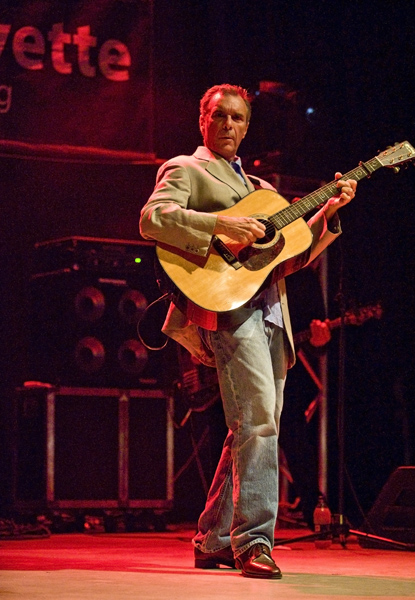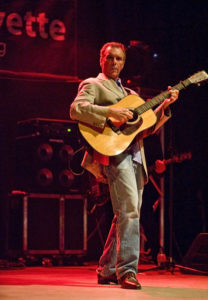Zachary Richard
Born in Scott, where he still maintains a home, Zachary Richard is a musician, poet, environmentalist, and cultural activist.

Courtesy of Cajun and Zydeco Photos, David Simpson
Zachary Richard performing at Downtown Alive in Lafayette. Simpson, David (Photographer)
Zachary Richard is an award-winning Cajun singer-songwriter and political activist who, for nearly four decades, has cultivated a dedicated following in the United States, French Canada, and France. The multi-instrumentalist frequently sings both in French and in English while playing piano, harmonica, or diatonic button accordion. Richard (pronounced “REE-shard”) synthesizes instrumental and rhythmic elements from many musical genres: Afro-Caribbean, New Orleans funk, rhythm and blues (R&B), country, rock ’n’ roll, traditional Cajun, and zydeco. The distinctly American character of his music, together with the substance of his songwriting, has garnered much attention in Québec and France, where Richard has achieved star status.
Richard’s success has raised the international profile of French Louisiana, particularly in Francophone circles. In 1980 the French Minister of Culture awarded the Cajun musician the Prix de la Jeune Chanson Française. In 1997 the French government named him an officier in the Ordre des Arts et Lettres de la République Française for his sustained efforts in promoting French culture in North America. In Québec, Richard has won five Félix awards (the Canadian province’s equivalent of the Grammy awards). Three universities across the continent also recognized Richard’s contributions: he has received honorary doctorates from the Université de Moncton (Music, 2005), the University of Louisiana at Lafayette (Fine Arts, 2008), and the Université Sainte-Anne (Literature, 2009).
Outside of music, Richard is a visible political activist, advocating for both environmental and Francophone rights in French North America (Québec, the Acadian Maritimes, and Cajun/Creole Louisiana). In addition, he has written three books of poetry and two children’s books, and he has produced and narrated many documentary films and television programs in Canada and the United States.
Early Career and Political Activism
Ralph Zachary Richard was born on September 8, 1950, in Scott, Louisiana, the only child of Eddie and Pauline Richard. As he recalled, “My parents suffered the cultural prejudice that hit their entire generation. French was strongly discouraged, even outlawed right here in French Louisiana.” As an adolescent, Richard learned to straddle overlapping cultural worlds. Though English remained his primary tongue, he vacillated between the competing French and English linguistic spheres of his parents’ world. His parents exposed him to politics when Eddie became mayor of Scott and to music when they enrolled their son at age eight in piano lessons and the Bishop’s Boys Choir.
Over the course of his career, Richard’s political affinities and musical sensibilities emerged in profound ways. His entry into radical politics came while enrolled at Tulane University in the late 1960s. He mingled with the Tulane Liberation Front, which “occupied” the campus in 1970 to protest the Vietnam War. During his junior year abroad, Richard cultivated his musical interests in Edinburgh, Scotland. He formed a band with two Czech musicians and “a drummer who was into the Grateful Dead.” Richard had become versed in styles ranging from The Rolling Stones to Ray Charles and Bob Dylan. Those formative experiences as a college student shaped the budding singer-songwriter’s career path.
Between September 1973 and March 1974, Richard, then twenty-one years old, signed with Elektra Records and relocated to New York City to record his first full-length album, High Time. The record featured both English- and French-language arrangements of original material and traditional compositions from the Cajun musical canon. While High Time foreshadowed the trajectory of Richard’s musical career, the album remained locked in a vault for thirty years, a casualty of the merger between Warner, Elektra, and Asylum Records.
Richard used the advance from Elektra to purchase a diatonic button accordion. He returned to Louisiana and formed a progressive Cajun ensemble he dubbed the Bayou Drifter Band, which featured his cousin and fiddler Michael Doucet (of BeauSoleil fame). The band struggled to find work. In early 1975, Richard traveled to Québec with a delegation from Lafayette at the behest of Gaullist emissary Philippe Rossillon, who, according to Richard, “opened [his] eyes to the necessity of fighting for French language and culture.” There, amid the separatist fervor gripping the province, the young Francophone musician found not only an enthusiastic audience but also a new political cause. “Québec revived a militancy in me which fell dormant after the Vietnam War. I had found a new field of combat,” he elaborated to Montreal’s La Presse in 2007. Upon returning to Louisiana later that year, Richard penned the lyrics to one of his most famous and enduring compositions, “Réveille.” The largely a cappella ballad recalls the Acadian deportation of 1755 and encouraged peoples of Acadian descent to “wake up to save your cultural and linguistic heritage.” With his fist raised in front of a banner emblazoned with the political slogan Solidarité—Fierte (“Solidarity—Pride”), Richard first performed “Réveille” in Louisiana at the 1975 Hommage à la musique Acadienne. Radical Francophone nationalism, however, did not translate well in Louisiana. He revealed to the Los Angeles Times in 1979 that “[he] refused to speak English for a little while until [he] realized [he] was screaming in the dark.”
Between 1976 and 1981, Richard spent much of his time in Montreal as he launched his musical career in earnest. His album Bayou des mystères highlighted rock-inspired, accordion-driven arrangements of traditional Cajun songs like “J’ai été au Bal” and “Le stomp de Bosco.” Bayou des mystères also featured several of Richard’s own compositions, including “Réveille” and “Chanson pour les enfants d’Acadie,” both of which emphasized the memory of a shared colonial past linking Louisiana’s Cajuns and Canada’s Acadians. Over the span of these five years, he recorded seven French-language albums: Bayou des mystères (1976), Mardi Gras (1977), Migration (1978), Allons danser (1979), Live in Montreal (1980), and Vent d’Été (1981), two of which—Mardi Gras and Migration—went gold in Canada. Meanwhile, two singles—“Travailler c’est trop dur” and “L’arbre est dans ses feuilles”—became widely popular across Francophone Canada and France.
During the 1980s, Richard returned to Louisiana and began a new phase of his career by recording a series of English-language records: Zack Attack (1984), Zack’s Bon Ton (1988), Mardi Gras Mambo (1989), Women in the Room (1990), and Snake Bite Love (1992). He toured extensively while cultivating a new audience in English-speaking North America by playing such high-profile gigs as the Late Show with David Letterman in 1992. He rekindled his Francophone career in 1994 when he performed at the first Congrès Mondial Acadien (World Acadian Congress) in New Brunswick, Canada. One year later, he recorded his most acclaimed album, Cap Enragé, at Studio La Frette in Paris, France, which became a double-platinum seller in Canada.
From the late 1990s through the first decade of the twenty-first century, Richard blazed a new path in the realm of music and cultural politics. Cap Enragé represented something of a musical departure from Richard’s earlier work. The album paints rich and atmospheric soundscapes—thanks in large part to French musician Freddy Koella’s expansive guitar sound. Richard continued to build on these ethereal textures across two French-language recordings, Coeur fidèle (1999) and Lumière dans le noir (2007), and the English-language album, Last Kiss (2009), which included a duet version of the classic composition by The Band, “Acadian Driftwood,” with famed Québécoise chanteuse Celine Dion. Amid these musical transitions, Richard continued to engage in the cultural politics of French North America. He founded Action Cadienne in 1996 with the support of Philippe Rossillon. This nonprofit volunteer organization dedicated itself to the promotion and protection of the French language in Louisiana.
In the wake of Hurricane Katrina and the BP Oil Spill of 2010, Richard increasingly devoted his energies and fame to raise awareness of the environmental implications of these disasters along the Gulf Coast. He released “Le Grand Gosier,” a single that features two compositions about Louisiana’s brown pelican population. All of the proceeds benefit Gulf Aid Acadiana, an organization dedicated to restoring the Gulf of Mexico.
Poetry
In 1978 Richard joined the stars of French Canada’s literary community as he performed before a crowd of three to four thousand at Parole et musique, an event marketed as an “encounter with the Francophone world.” That experience compelled Richard to organize and edit an anthology of contemporary Louisiana French poetry with his friend and colleague Barry Jean Ancelet. The book, Cris sur le bayou (1980), helped propel Richard into the vanguard of the Cajun Renaissance. That same year, Richard published a compendium highlighting his own verse, Voyage de nuit.
Drawing inspiration from Franco-American Beat poet Jack Kerouac, many of Richard’s poems are snapshots of contemporary life filtered through a French North American sensibility. Poetry also became a political platform for Richard to celebrate nature and critique French culture’s place in North America. “Poème aux têtes de cochon,” for example, alludes to the Acadian student movement agitating for linguistic recognition in the province of New Brunswick at the Université de Moncton during the 1960s. The poem also documents Richard’s confrontation with Canadian police in Moncton, New Brunswick, on August 15, 1975, during la Fête nationale des Acadiens (the Acadian national holiday). In 1997 Richard published his second oeuvre, Faire récolte, which won the Prix Champlain. His third volume, Feu (2007), featuring an ode to Philippe Rossillon, won the Prix Roland Gasparic in Romania.
Documentary Film and Television Production
Zachary Richard has long been a muse for French Canadian filmmakers. In 1975 director Bernard Gosselin recorded Richard’s performance at the traditional music festival Les Veillées d’automne in Montreal under the auspices of Canada’s National Film Board. The film, released in 1976 as La Veillée des veillées, exposed a wider audience to Richard’s compelling performance of the Acadian lamentation “La Maudite Guerre” (“The Cursed War”) and “Réveille.” In 1976 Canadian filmmaker André Gladu highlighted Richard as part of his ambitious twenty-six-part series “Le Son des Français d’Amérique” (“The Sound of French North America”). The Louisiana component, “Le Son des Cajuns” (“The Sound of the Cajuns”), included a thirty-minute short film titled “Réveille,” spotlighting Richard.
In 2000, in collaboration with Louisiana Public Broadcasting and Cajun documentary filmmaker Pat Mire, Richard produced, narrated, and scored the soundtrack to Against the Tide: The Story of the Cajun People of Louisiana. The film offers a sweeping overview of the Cajun experience, from the expulsion of Acadians in Canada in the mid-eighteenth century through Louisiana’s Cajun Renaissance of the late twentieth century, to contemporary efforts to preserve French in the state. Selections from his 1999 album Coeur fidèle became part of the film’s soundtrack. Richard went on to narrate the twenty-six-part Canadian television series Coeurs Batailleurs, which examined the cultures and peoples who grew out of the Acadian diaspora.
The corpus of Zachary Richard’s work revolves around sustaining French in North America. “Without the language, you have only a vestige of the culture,” he maintains. “Other aspects of the culture, such as music or cuisine, may survive, but the language may disappear here [in Louisiana] in a generation. That is unacceptable.”
